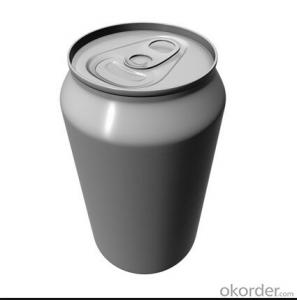Aluminum Beverage Can Made in China with High Quality
- Loading Port:
- Guangzhou
- Payment Terms:
- TT or LC
- Min Order Qty:
- 3710000 pc
- Supply Capability:
- 100000000 pc/month
OKorder Service Pledge
OKorder Financial Service
You Might Also Like
1.Structure of Aluminum Beverage Can Description:
An Aluminum Beverage can is a container for packaging made primarily of aluminum (BrE aluminium).It is commonly used for foods and beverages.Aluminum cans are made of two pieces. The bottom and body are "drawn" or "drawn and ironed" from a flat plate or shallow cup. After filling, the can "end" is sealed onto the top of the can.Aluminum offers greater malleability, resulting in ease of manufacture; this gave rise to the two-piece can, where all but the top of the can is simply stamped out of a single piece of aluminium, rather than laboriously constructed from two pieces of steel. A label is either printed directly on the side of the can or will be glued to the outside of the curved surface, indicating its contents.
2.Main Features of the Aluminum Beverage Can :
1)light weight
2)competitive cost
3)usage of easy-open aluminum ends: no need for a can opener
4)clean appearance
5)aluminum does not rust
3.Aluminum Beverage Can Image:
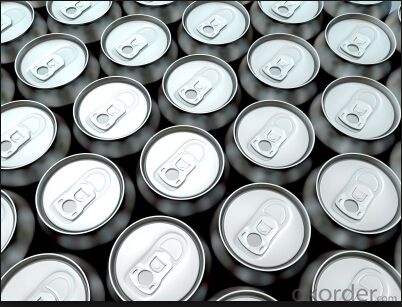
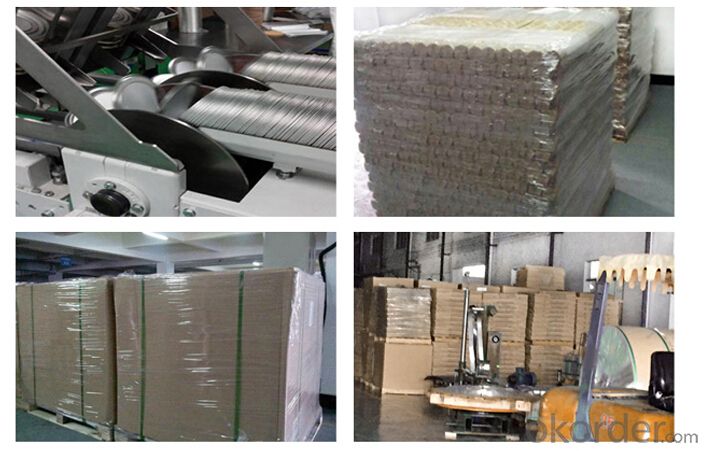
4.Aluminum Beverage Can Specification:
Item No. | 200 # |
Shape/type | Round |
Size(mm) | Dia 50mm |
Coating | Gold inside & Clear outside |
Material | Aluminum |
Pcs/20 GP’ | 3,710,000pcs per 20 GP or Customize packing: as clients’ requests. |
Features | 1.Used for packaging of beverage,such as juice,soda,energy drink,etc. 2.Coating can be according to customer required.
|
5.FAQ:
1)Q: What is the material of your products?
A: The material are mainly tinplate and Aluminium
2)Q: Can you make new mold with customized size I need?
A: YES, We can make mold for you .
3)Q: How does your factory do regarding quality control?
A : Our company has a professional EOE testing and managing team, providing customers with quality and reliable products through strict control of process analysis, implementation of the HACCP system, combined with top testing equipments and specified rational testing standards.
6.Certificate:
1)Top Fortune Global 500
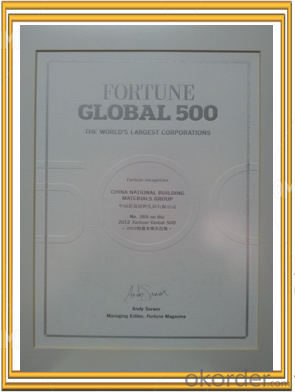
2)SGS Certificate
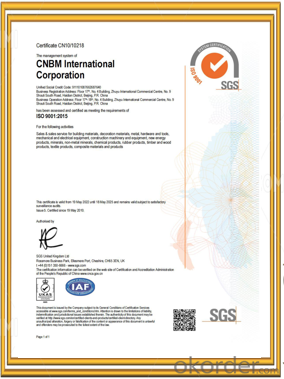
- Q:How many companies have used aluminum coil?
- Too many. All the companies who make the aluminum products you have seen in daily life have used it. So it is hard to explain.
- Q:How are aluminum coils tested for quality control?
- Aluminum coils go through numerous quality control tests to ensure their reliability and performance. One primary test is the dimensional inspection, where the coils' physical dimensions are measured and compared to the manufacturer's specifications. This helps identify any discrepancies in length, width, thickness, or diameter. Another critical test is the visual inspection, where the coils are thoroughly examined for surface defects like scratches, dents, or discoloration. This visual examination is crucial to ensuring that the coils meet the required aesthetic standards. To evaluate the mechanical properties, various mechanical tests are conducted. Tensile strength tests measure the coils' resistance to breaking under tension, determining their durability and strength. In addition, hardness tests assess the coils' resistance to indentation or deformation. The hardness values are compared to predetermined standards to verify if the coils meet the necessary criteria. Corrosion resistance testing is also conducted to assess the coils' ability to withstand corrosion over time. This test exposes the coils to harsh environments or corrosive substances, which is crucial as aluminum is often used in applications that may involve contact with corrosive elements. Electrical conductivity tests ensure the proper functioning of the coils in electrical applications. Conductivity is measured and compared to the required specifications to guarantee that the coils possess the desired electrical characteristics. Additionally, depending on the specific requirements of the aluminum coils, other tests like chemical composition analysis, surface roughness evaluation, and coating adhesion tests may also be performed. Overall, these comprehensive quality control tests enable manufacturers to ensure that aluminum coils meet necessary standards, ensuring their quality, performance, and reliability in various applications.
- Q:Are there any environmental benefits to using aluminum coils?
- Using aluminum coils offers several environmental benefits. First and foremost, aluminum is a highly sustainable material that can be recycled without losing its original properties. This reduces the need for mining and extracting new raw materials, thereby decreasing the environmental impact of these processes. Additionally, recycling aluminum requires only a fraction of the energy needed to produce primary aluminum, resulting in substantial energy savings and reduced greenhouse gas emissions. In addition, aluminum coils have a longer lifespan compared to other commonly used materials like copper or steel. This means that fewer coils need to be manufactured and replaced over time, leading to reduced waste generation and a lower overall environmental impact. Furthermore, aluminum is corrosion-resistant, eliminating the need for potentially harmful treatments or coatings. This reduces the release of hazardous substances into the environment during the manufacturing and use of aluminum coils. Lastly, aluminum's lightweight nature contributes to lower transportation costs and energy consumption during distribution. This results in decreased fuel consumption and associated emissions, ultimately reducing the carbon footprint of using aluminum coils. Taking all these factors into consideration, the use of aluminum coils provides significant environmental benefits, including reduced resource extraction, energy conservation, waste reduction, and lower emissions.
- Q:I was at an art festival and saw one of the most unique displays ever. The artist had painted abstract art on a piece of aluminum (or some type of aluminum type sheeting) I, being a novice artist for many years, was very intrigued and would LOVE to learn more about it. I've done searches on the internet, to no avail. Anyone have any ideas?
- I've known a couple of people who do this, you might try a search on Floating Panel. You could try to search out things on an artist called Gary Hume, as I know that his earlier paintings, certainly the ones for which he's known, were executed on aluminium. From what I remember of people doing this (some one on my MA made paintings on aluminium) the trick is in the priming, it being a non-pours surface. You need to rough the ground considerably and prime quite thickly. You also need to baton on the back, this will allow you to attach to the wall without ruining the face of the support, and prevent the possibility of warping. What looks great is if you recess the batons from the edge of the support, so that when against the wall they cannot be seen, this gives the appearance of hovering, and shows the thinness of your support. Another reason you might not be getting too many hits on your searches is the spelling, while not incorrect you might find art suppliers using the English, rather than the American spelling; aluminium rather than aluminum. I know that sounds petty but it might make a difference. The only other thing I know, while finding it a great surface to work on, smooth, bright, the artist I know also found it very expensive.
- Q:What is the lifespan of aluminum coils?
- The lifespan of aluminum coils can vary depending on various factors such as the quality of the coil, installation method, maintenance practices, and environmental conditions. However, on average, aluminum coils can last anywhere from 10 to 20 years or even longer with proper care and maintenance.
- Q:How are aluminum coils made?
- Aluminum coils are made through a process called continuous casting and rolling. The process begins with the melting of aluminum ingots or scrap in a furnace. Once the molten aluminum reaches the desired temperature, it is transferred to a holding furnace. From there, the molten aluminum is continuously cast into a solidified strip, which is then fed through a series of rolling mills. The rolling mills apply pressure to the aluminum strip, reducing its thickness and increasing its length. This process is repeated multiple times until the desired thickness and width are achieved. During the rolling process, the aluminum strip is also cooled and lubricated to prevent it from sticking to the rollers and to enhance its surface finish. After rolling, the aluminum strip is coiled to form a continuous sheet of aluminum coil. The coils are typically wound tightly to minimize any air gaps and ensure stability during transportation and storage. At this stage, the coils can undergo additional processes such as annealing, where they are heated and slowly cooled to improve their mechanical properties and make them more suitable for specific applications. Overall, the production of aluminum coils involves a combination of melting, casting, rolling, and coiling processes, all aimed at producing high-quality coils with the desired dimensions and properties.
- Q:What are the different coil cutting options available for aluminum coils?
- Some of the different coil cutting options available for aluminum coils include slitting, shearing, and laser cutting.
- Q:What are the different grades of aluminum used in coils?
- There are several different grades of aluminum used in coils, each with its own specific properties and applications. The most commonly used grades include: 1. 1000 series: This grade of aluminum is commercially pure and has excellent corrosion resistance. It is often used in applications where high corrosion resistance is required, such as in chemical processing equipment or marine components. 2. 3000 series: These alloys are known for their moderate strength and excellent formability. They are often used in cooking utensils, heat exchangers, and general sheet metal fabrication. 3. 5000 series: This grade of aluminum is known for its excellent weldability and corrosion resistance. It is commonly used in marine environments, as well as in transportation and structural components. 4. 6000 series: These alloys are known for their combination of strength, formability, and corrosion resistance. They are widely used in architectural applications, such as window frames, doors, and curtain walls. 5. 7000 series: This grade of aluminum is known for its high strength and toughness. It is often used in aerospace applications, as well as in sporting goods and automotive parts where strength is critical. These are just a few examples of the different grades of aluminum used in coils. The choice of the grade depends on the specific requirements of the application, such as strength, corrosion resistance, formability, and weldability.
- Q:What is the thermal conductivity of aluminum coils?
- Compared to other metals, aluminum coils exhibit a relatively high thermal conductivity. With approximately 237 W/m·K, aluminum possesses excellent heat conduction capabilities. This particular attribute renders aluminum coils well-suited for situations necessitating efficient heat transfer, like heat exchangers or air conditioning systems. The remarkable thermal conductivity of aluminum enables rapid and effective dissipation of heat, thereby guaranteeing optimal performance and energy efficiency across diverse industrial and residential environments.
- Q:... of aluminum atoms?(mole = 6.022x10^23)
- My lady I nevertheless use it to cook dinner my hams and turkeys and to save nutrition interior the frig, yet its growing to be a dinosaur and its on its final leg and there is unquestionably one of those super form of different issues now we are able to apply yet interior the previous years it had its use yet technology and Tech. has come and made it out of date. yet nevertheless i like to apply it on ocassions
1. Manufacturer Overview |
|
|---|---|
| Location | |
| Year Established | |
| Annual Output Value | |
| Main Markets | |
| Company Certifications | |
2. Manufacturer Certificates |
|
|---|---|
| a) Certification Name | |
| Range | |
| Reference | |
| Validity Period | |
3. Manufacturer Capability |
|
|---|---|
| a)Trade Capacity | |
| Nearest Port | |
| Export Percentage | |
| No.of Employees in Trade Department | |
| Language Spoken: | |
| b)Factory Information | |
| Factory Size: | |
| No. of Production Lines | |
| Contract Manufacturing | |
| Product Price Range | |
Send your message to us
Aluminum Beverage Can Made in China with High Quality
- Loading Port:
- Guangzhou
- Payment Terms:
- TT or LC
- Min Order Qty:
- 3710000 pc
- Supply Capability:
- 100000000 pc/month
OKorder Service Pledge
OKorder Financial Service
Similar products
New products
Hot products
Hot Searches
Related keywords

